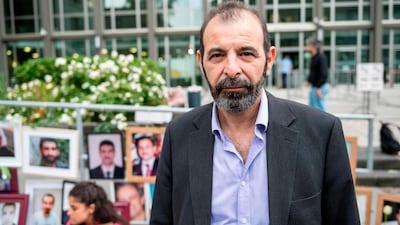A prominent Syrian lawyer due to have his day in court on Thursday has spoken of his excitement at the thought of giving evidence against the “monster” who put him in prison more than a decade ago.
Anwar Al Bunni, who spent five years in one of Syria’s notorious jails but is now a refugee in Germany, is finally seeing progress in his long campaign to bring to justice high-profile members of President Bashar Al Assad’s regime.
The trial in Koblenz on Thursday of Anwar Raslan, a former Colonel in the Syrian Army, is widely regarded as an important milestone in the prosecution of former Assad officials for war crimes.
Mr Raslan, a former Colonel in the Syrian Army, is accused of involvement in the murder of 58 demonstrators in 2011 and the torture of 4,000 others in the Al Khatib detention centre in Damascus.
He and his fellow accused, Eyad Al Gharib, 43, are being tried on the principle of universal jurisdiction, which allows a foreign country to prosecute crimes against humanity.
Mr Raslan, 57, defected and fled Syria at the end of 2012 before arriving in Germany in July 2014, but was spotted by Mr Al Bunni at a shop.
The veteran human rights lawyer is at pains, though, to make clear that his enemy is the whole Syrian regime and not only Mr Raslan.

"I am so excited you know, so excited not just about Anwar Raslan," Mr Al Bunni told The National before heading into court to face his jailer.
“Anwar Raslan is to me like any criminal,” he said. “I don’t have any feeling against him personally. He’s a criminal. He must face justice, and I’m excited because Anwar Raslan is an important part of the machine who work in Syria, arresting people, torturing them, killing them and hiding their bodies.
“This will be a very important moment because it will be exposed publicly. We submitted files in front of the prosecutor and nobody knows anything about the facts. But now it will be public in court in front of all the people and the victims will face the criminals,” he said.
At the opening of the trial in April, prosecutors alleged that the former Syrian Army colonel had overseen rape and sexual abuse, electric shocks, beatings with "fists, wires and whips" and sleep deprivation at the jail.
Mr Raslan, who worked for the Assad intelligence services for 18 years, denies the charges against him and says that he feels “regret and compassion” for the victims of torture in Syria.
Mr Al Gharib is accused of being an accomplice to crimes against humanity in the trial that could last two years.
According to Mr Al Bunni, the prosecution of one or two figures from the Assad regime is not enough, and he pledged to continue his campaign for justice.
“He’s just one of the criminals,” he said. “I feel against him like I feel against Bashar [Al Assad] and against others. All of them work in this machine and I target all of the machine.
“I hope, and I am sure it will happen, to tell everybody what Anwar Raslan and those like him from the other [prison] branches did. How [there is a] big monster inside them. How you cannot describe them as a human. They cannot think as a human.”


